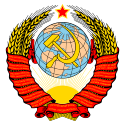- Soviet of Nationalities
-
The Soviet of Nationalities (Russian: Совет Национальностей), was one of the two chambers of the Supreme Soviet of the Union of Soviet Socialist Republics, elected on the basis of universal, equal and direct suffrage by secret ballot in accordance with the principles of Soviet democracy. As opposed to the Soviet of the Union, the Soviet of Nationalities was composed of the nationalities of the Soviet Union, which in turn followed administrative division rather than being a representation of ethnic groups.
The Soviet of the Nationalities was formed on the basis of equal representation of all the Republics of the Soviet Union (32 deputies from each republic, excluding other autonomous units inside that republic which used to send in separate members), autonomous republics (11 deputies from each republic), autonomous oblasts (five deputies from each oblast), national districts (one deputy from each district). In the Soviet of the Nationalities, the largest of the republics, the Russian SFSR with a population of 147 million, and the smallest republic, the Estonian SSR with a population of about 1.5 million, got 32 deputies each. Russians as an ethnic group made up more than half of the population of the Soviet Union, but the Soviet of Nationalities did not represent ethnic groups, it represented the different nationalities as expressed by the republics and various autonomous units of the Soviet Union. This electoral system seriously diminished representation of larger ethnic groups in favor of the smaller ethnic groups of the Soviet Union, with the Russians being most underrepresented.
The Soviet of Nationalities enjoyed the same rights as the Soviet of the Union in the area of legislative initiative and in resolving other issues inside the competence of the Union of the SSR.
The Soviet of Nationalities elected a chairman (who would lead the sessions of the chamber), his four deputies and permanent commissions: Mandate Commission, Commission on Legislative Suppositions, Budget Planning Commission, Foreign Affairs Commission, Youth Affairs Commission, Industry Commission, Transportation and Communications Commission, Construction and Industry of Building Materials Commission, Agricultural Commission, Consumer Goods Commission, Public Education Commission, Science and Culture Commission, Trade Commission, Consumer Service and Municipal Economy Commission, Environmental Commission.
The presidium of the Soviet of Nationalities "ceased all noticeable work at the end of 1937," but it did "survive as the sole central political institution formally devoted to the nationalities question."[1]
It was briefly succeeded by the Soviet of the Republics October-December 1991.
References
- ^ Terry Martin, The Affirmative Action Empire: Nations and Nationalism in the Soviet Union, 1923-1939 (Cornell University Press, 2001: ISBN 0801486777), p. 412.
See also
- Chairman of the Soviet of Nationalities
- Korenizatsiya
- Soviet of Nationalities of the Russian SFSR
Categories:- Government of the Soviet Union
- Historical legislatures
- 1938 establishments in the Soviet Union
- 1991 disestablishments
Wikimedia Foundation. 2010.

